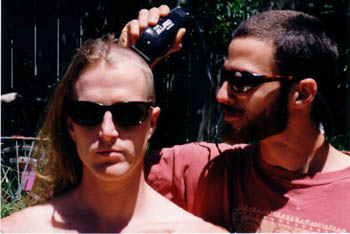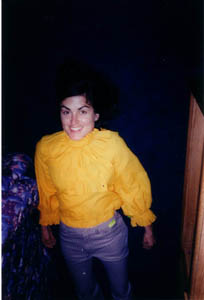![[Metroactive Music]](/music/gifs/music468.gif)
[ Music Index | Santa Cruz Week | SantaCruz Home | Archives ]
2 Cool 2B Forgotten
Former What Is Art? scenesters remember Santa Cruz's late, great underground music hub as they reunite for a show this weekend
By Mike Connor
This story starts with an empty lot, just behind the Clock Tower downtown. Depressing, yeah? But then, thanks to the miracle of narrative time-travel and the memories of three local songwriters--Eli Salzman, Viola Keeton and Matthew Embry--the tiny little black-box theater known enigmatically as What Is Art? peeks out its head from behind the sands of time and space.
While WIA? no longer exists as the unique performance space that it was in the mid-to-late-'90s (the whole block was demolished), it still serves, like any former cultural hub, as a sort of looking glass that can magnify the strengths and weaknesses of the current local scene.
Sitting outside Cafe Time Machine downtown, our three trusty guides are happy to tell their stories to me. All three of them--along with John Malkin, Leaf and Josh Friedman--will perform at the Six Wavelengths show at the 418 Project on Saturday, May 10, but first we take some time to revisit the ghost of Santa Cruz's recent past.
Salzman, an outstanding local singer/songwriter whose deeply personal Radiohead-and-Jeff Buckley-inspired folk-rock originals have been wowing listeners up and down the West Coast, recalls the tiny, sweaty vibe of WIA?, which he describes as "infectious ... literally. If somebody sneezed in the back, everybody got the same cold."
Embry chimes in: "That SARS thing, it began there, but then it went into a hibernation/incubation period."
What Is Art? was a tiny, 50-person-capacity venue founded by Lopi Larow, a seamstress who opened the space as a place where she could sell her handmade clothes. Slowly, it evolved into an art space a la the Cayuga Vault, where the focus was on the art, rather than selling any particular thing. The seamstress worked her magic, creating a close-knit web of folks who both performed and helped run the venue.
Keeton, whose hauntingly beautiful voice and ethereal guitar playing land her music somewhere between folk and a deeply moody film score, compares Lopi's system to a co-op, and Salzman agrees: "Absolutely," he says, "Lopi brought together a collective ... intermittently. I mean sometimes it would dissolve, and there would still be Lopi holding the torch. So, in some ways it's like the ideal model. It's like, consensus, but when consensus falls apart, there's always, you know, a theocracy ... but it was definitely a nurturing space, very laid-back, very easy to get up in front of people, and very supportive in a lot of ways. It also had a lot of local color, a lot of people would come into open-mics. And it kept going that way. It only closed because that whole block was going to get torn down."
According to Salzman, Lopi is now living in Manhattan.
"She lives exactly right in ground zero actually," he jokes. "She has a little cave underneath it. She calls it What Is 9/11?"
2 Cool 4 School
These three longtime locals marvel at all the talent still in town, but considering the stylistic diversity they saw at WIA night in and night out, they lament the fractured, cliquey tendencies of performers and audiences in Santa Cruz. Embry in particular has a beef with the cliques parading around town like so many chunks of hardened rubber.
"I definitely experience this town as pretty reserved, not very close-knit," says Embry. "There's so many artists and so many people doing stuff, and they seem not that open to building something that's more cohesive beyond these little groupings, like people dressing in black being like, 'Oh, we like indie,' or blah blah blah. I'm so sick of all that shit. When people ask what kind of music will be at the [Six Wavelengths] show, I really don't wanna tell them, and I've been saying, 'Oh, it's all diverse, everybody's really different, it's not any one particular genre.'"
Embry flips us the bird to emphasize his frustration. We laugh; he smiles and asks, "You know?"
Indeed, everyone who's been to high school knows the retardant effects of the pack mentality of cliques, which are only slightly less malignant microversions of the Us-and-Them mentality that eventually leads to wars and Pink Floyd songs. Embry, whose wildly eclectic piano playing and surreal songwriting reflect his independent views, looks forward to a time when, like some of the maverick composers of yore, people stop pledging their allegiance to certain schools of music.
"What Is Art? was really cool because there was no particular genre or style, and people were really taking it in," says Embry. "They were feasting on it, man."
Indeed, the open-mic nights at WIA? were a feast for all the senses, stimulating the heart and the mind with plenty of music and poetry, and even stimulating that most primal of all instincts--fear. Says Embry, "Some people would just get up there and speak their minds, and not everything about it was artistic, people would sometimes get up there and just freak out or just talk about what they were doing. One time, somebody did the infamous 'burning things and destroying things' performance where, you know, glass was being smashed and things were being lit afire ... it was intense. We had to make a rule so that didn't happen anymore--not like that happened very often, but there really was a diversity."
"There was some interesting group shows there," says Embry. "One was What Is Erotica? They had a weekend of all these ... things. That got a little weird. In pretty much good ways, though. It was good."
Back 2 the Future
These days, Embry has a radio show on Free Radio Santa Cruz called Technical Difficulties (Sundays at 8pm on 96.3-FM). Although he claims to have Lisa Marie Presley, Kid Rock and Eminem coming into the studio for this week's show, you'll have to content yourself with listening between the lines of the live, remixed electronic music that Embry creates each week.
Then, show up at the Six Wavelengths concert. In addition to Embry, Salzman and Keeton, Embry's fellow Free Radio DJ and composer/musician John Malkin will perform minimalist pieces on the piano, while guitar major and singer/songwriter Josh Friedman will play a poppier blend of modern folk. Creative hoser, composer and sonic burglar Leaf rounds out the bill with experimental sound paintings coaxed from homemade electronic musical contraptions.
Together, they may just knit the framework--or, trans-genre cardigan, if you will--of an all-inclusive local music revival which might just enable people to ask the question that people have been asking since time immemorial: What is art?
Copyright © Metro Publishing Inc. Maintained by Boulevards New Media.
![]()

Is This Far Enough Above the Ears? Eli Salzman gives Matthew 'Levity' Embry a little touch-up.

Pop Goes the Songwriter: Viola Keeton does her best imitation of a jack-in-the-box.
Matthew Embry, Viola Keeton, Eli Salzman, Leaf, John Malkin and Josh Friedman perform at the 418 Project, 418 Front St., Santa Cruz, on Saturday, May 10, at 8pm. Tickets are $5-$10 (sliding scale); call 831.460.0848 for more info.
From the May 7-14, 2003 issue of Metro Santa Cruz.